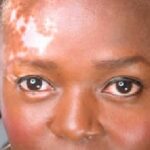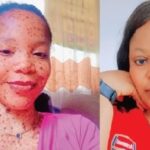Why people call my daughter living with vitiligo leopard, idol — Mother
Why people call my daughter living with vitiligo leopard, idol — Mother
A Mother’s Resilience: Supporting a Daughter with Vitiligo

By Temitope Adetunji
Adeola Ojetola Shares Her Daughter’s Journey with Skin Conditions

Could you tell us about your daughter’s vitiligo and freckles, as you mentioned in a recent video?
I’m Adeola Ojetola, an educationist and businesswoman selling beauty products, residing in Meran Alagbado, Lagos. My 15-year-old daughter, Oluwatomisin, developed freckles and vitiligo when she was about a year old. Initially, her skin was fair but gradually began to show white patches.
Did you seek medical advice for her condition?
Yes, I consulted doctors at Ikeja General Hospital and later in Lome, Togo. Initially, sunscreen was prescribed, but eventually, I was advised to stop using creams and only use sun protection.
Is she your only child?
No, she has a sibling.
How did you feel when you first noticed her skin condition?
At first, I wasn’t overly concerned as doctors assured me it was just a unique skin type. However, as she grew older and started facing discrimination, it became more worrying for me.
Can you share a moment that was particularly difficult for you as a mother?
One day, she came home from school very upset because her peers were teasing her about her skin. They called her names like “leopard skin” and “monster.” Seeing her so distressed was heartbreaking for me.
What class is she in now?
She’s currently in SSS 2.
How has her father supported her through these challenges?*
He has been a strong support, always encouraging her to stand up for herself and not be bothered by negative comments.
Have you received any unsolicited advice regarding her condition?*
Yes, people have given various unsolicited suggestions and even called her an ancient idol. I’ve learned to ignore such comments.
How do you support and encourage her?*
I researched her condition online and found someone with a similar skin type to speak with her. This helped her feel less alone and boosted her confidence. She’s interested in modeling, which I plan to support once her schoolwork is less demanding.
How has this experience impacted your family?*
It has brought visibility to our family, both positively and negatively. People recognize her easily because of her unique appearance.
What traits suggest she might enjoy modeling?
She has a keen interest in fashion and a confident attitude. She’s expressed a desire to pursue modeling, and I think it will help boost her confidence.
Have you sought professional help for her?
No, but inviting someone with a similar condition to talk to her has helped build her confidence.
What can society do to prevent bullying based on physical appearance, especially in Nigeria?*
Nigerian society needs to change its mentality towards people who look different. Education and awareness are crucial. Bullying based on appearance should be addressed seriously, just as it is in other countries.
What are your future ambitions for her?
I fully support her dreams, whether it’s modeling or becoming a gynecologist. I encourage her to pursue whatever she’s passionate about.
How has she shown signs of overcoming emotional trauma?
She’s become more confident and assertive, often standing up to people who stare or make comments about her skin. Her self-esteem has improved significantly.
*What advice would you give to other parents whose children face bullying?*
Parents should embrace and support their children, reminding them of their unique qualities and building their confidence. Open communication and reassurance are key.
TRENDING SONGS
 Ahmad Yerima: Naval Officer to Face No Sanctions After Clash with Wike – Matawalle
Ahmad Yerima: Naval Officer to Face No Sanctions After Clash with Wike – Matawalle
 Trending Video: Muslim Man Joins Wife in Hallelujah Challenge ‘Dress Like Your Miracle’ Night
Trending Video: Muslim Man Joins Wife in Hallelujah Challenge ‘Dress Like Your Miracle’ Night
 Woman Seeks Advice as Late Brother’s Wife Refuses to Mourn Him Following His Death With Alleged Mistress
Woman Seeks Advice as Late Brother’s Wife Refuses to Mourn Him Following His Death With Alleged Mistress
 Nobody Cares About Fine Girls In The UK, I Miss Nigeria — Nigerian Lady Laments
Nobody Cares About Fine Girls In The UK, I Miss Nigeria — Nigerian Lady Laments
 Wedding Called Off: How Lady Cancels Wedding After Finding Out Finance’s Affairs With Her Bestie
Wedding Called Off: How Lady Cancels Wedding After Finding Out Finance’s Affairs With Her Bestie
 Heartbreak in Ikeja: Lady Weeps After Fufu Found in New Phone Package
Heartbreak in Ikeja: Lady Weeps After Fufu Found in New Phone Package
 Twist of Fate: Man Who Questioned Phyna’s ₦1Billion Demand Mourns Brother in Dangote Truck Crash
Twist of Fate: Man Who Questioned Phyna’s ₦1Billion Demand Mourns Brother in Dangote Truck Crash
 Tragedy in Enugu: Dangote Truck Claims Lives of Family of Five
Tragedy in Enugu: Dangote Truck Claims Lives of Family of Five
 Bangkok Crackdown: Nigerian-Thai Couple in Police Net Over Drug Trafficking
Bangkok Crackdown: Nigerian-Thai Couple in Police Net Over Drug Trafficking
 Family Rift: Reno Omokri’s Ex-Wife Says He Deserted Their Special Needs Son
Family Rift: Reno Omokri’s Ex-Wife Says He Deserted Their Special Needs Son
Share this post with your friends on ![]()













